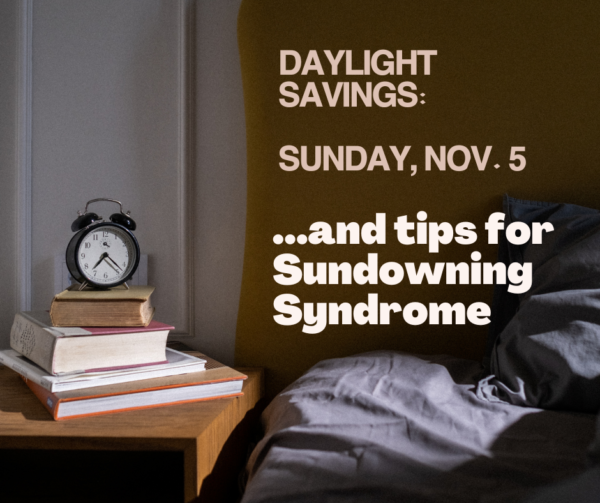 As the seasons change and the days grow shorter, we welcome the end of daylight saving time. While many of us appreciate the extra hour of sleep, this transition can be challenging, particularly for individuals with dementia. One phenomenon that frequently occurs during this time of the year is known as Sundown Syndrome, also called “Sundowning.” In this blog, we’ll explore what Sundown Syndrome is, why it can be exacerbated by the end of daylight saving time, and how Cypress HomeCare Solutions, an in-home care company in Arizona, can provide essential support for those affected by dementia and Sundown Syndrome.
As the seasons change and the days grow shorter, we welcome the end of daylight saving time. While many of us appreciate the extra hour of sleep, this transition can be challenging, particularly for individuals with dementia. One phenomenon that frequently occurs during this time of the year is known as Sundown Syndrome, also called “Sundowning.” In this blog, we’ll explore what Sundown Syndrome is, why it can be exacerbated by the end of daylight saving time, and how Cypress HomeCare Solutions, an in-home care company in Arizona, can provide essential support for those affected by dementia and Sundown Syndrome.
Understanding Sundown Syndrome
Sundown Syndrome is a term used to describe a cluster of symptoms that typically worsen in the late afternoon and evening. It’s common among individuals with dementia, particularly Alzheimer’s disease. The exact cause of Sundown Syndrome remains unclear, but various factors contribute to its occurrence:
Biological Clock Disruption: People with dementia often experience disruptions in their internal body clocks, which regulate sleep-wake patterns. This disruption can lead to increased confusion and agitation during the late afternoon and evening.
Fatigue: Throughout the day, individuals with dementia may experience fatigue from cognitive and physical efforts. This accumulated fatigue can intensify as the day progresses, leading to increased behavioral issues.
Reduced Lighting: Natural daylight diminishes as evening approaches, causing changes in lighting conditions. For those with dementia, reduced lighting can lead to disorientation and increased anxiety, as they find it challenging to distinguish between day and night.
Daylight Saving Time and Sundown Syndrome
The end of daylight saving time in the fall can exacerbate the symptoms of Sundown Syndrome for individuals with dementia. While gaining an extra hour of sleep may seem beneficial, it can disrupt established routines and exacerbate confusion. Here’s how the time change affects those with dementia:
Altered Routines: The shift in time can disrupt daily routines that are critical for individuals with dementia. Simple activities like meal times, medication schedules, and bedtime routines can become disorganized, leading to increased anxiety and distress.
Increased Darkness: As the days grow shorter, there’s a decrease in natural light during the late afternoon and early evening. This change can intensify Sundown Syndrome symptoms, making it even more challenging for individuals to distinguish between day and night.
Caregiver Stress: Family members and caregivers may experience increased stress during the time change, as they work to adjust to new routines and manage the heightened symptoms of Sundown Syndrome.
How Cypress HomeCare Solutions Can Help
Cypress HomeCare Solutions, an in-home care company in Arizona, understands the unique challenges faced by individuals with dementia and their families during daylight saving time. Our highly trained and compassionate caregivers are experienced in providing specialized care and support, particularly for those dealing with Sundown Syndrome. Here’s how our services can benefit you and your loved one:
Personalized Care Plans: We create personalized care plans tailored to the specific needs and preferences of your loved one. Our caregivers can help maintain consistent daily routines, ensuring that mealtimes, medication schedules, and bedtime routines are followed.
Supervision and Companionship: Our caregivers offer companionship and supervision during the late afternoon and evening hours when Sundown Syndrome symptoms tend to intensify. This reduces anxiety and provides a calming presence for your loved one.
Light Therapy: Cypress HomeCare Solutions can incorporate light therapy into your loved one’s care plan. Light therapy involves using specialized lighting to mimic natural daylight, which can help reduce confusion and distress caused by changing lighting conditions.
Respite for Family Caregivers: We understand that daylight saving time can be a challenging period for family caregivers. Cypress HomeCare Solutions provides respite care, offering family members a break and peace of mind knowing their loved one is well cared for.
As we bid farewell to daylight saving time, it’s crucial to be mindful of the challenges it can pose to individuals with dementia, particularly those dealing with Sundown Syndrome. Cypress HomeCare Solutions is here to provide the support and care your loved one needs during this time of transition and throughout the year.
Our compassionate caregivers are dedicated to enhancing the quality of life for those with dementia and ensuring their safety and well-being. If you or a loved one is in need of in-home care services, don’t hesitate to reach out to Cypress HomeCare Solutions. We’re here to help you navigate the challenges of dementia and provide the care and support your family deserves. Give us a call today and let us assist you in providing the best possible care for your loved one during this season of change.
